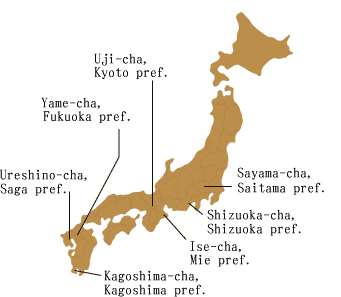
The conditions for producing good tea leaves are well-drained
soil, abundant rainfall, and temperature differences during
daytime and at night. The climate and the production method
create a tea peculiar to the area.
Sayama-cha, Saitama Prefecture
Traditional production center in the Kanto area. The tea leaves
are strongly roasted in the final stage of production. This
process produces sweetness and richness as well as an astringent
taste. This tea has had a reputation for good taste since
ancient times.
Shizuoka-cha, Shizuoka Prefecture
Shizuoka is the largest production center in Japan. Most
of the tea produced here is Sencha. Kakegawa and Kikukawa
located in the south are the origin of Fukamushi (deeply
roasted) tea and produces premium Fukamushi-cha. Kawane,
Tenryu and the upstream area of the Abe River are located
on the riverside in the north and produce premium tea with
the characteristics of a refreshing aroma and mild taste
peculiar to the production area in the mountains.
Ise-cha, Mie Prefectur
The area produces distinctive tea with a strong aroma and
taste. Kabuse-cha is a famous cultivation method that maximizes
sweetness. The region is third in production quantity in
Japan.
Uji-cha, Kyoto Prefecture
The Uji region is said to be the origin of Japanese tea
and is a historical production area. It boasts extremely
high quality tea. Gyokuro, Macha, and premium Sencha are
famous nationwide. It has an excellent aroma and sweet taste.
Kagoshima-cha, Kagoshima Prefecture
The second largest production area after Shizuoka. Many
of the producers are young and have made rapid progress
in quality and quantity. The taste is full of strength and
richness. It has a characteristic aroma peculiar to the
southland.
Yame-cha, Fukuoka Prefecture
A famous production area for Gyokuro. The area enjoys well-drained
soil and cool and pluvious temperatures which produce tea
of good quality. The taste is rich and sweet.
Ureshino-cha, Saga Prefecture
Famous Kamairi-cha (roasted in a pot) tea is produced following
traditional production methods. It has a less astringent,
refreshing, and mild taste.
|